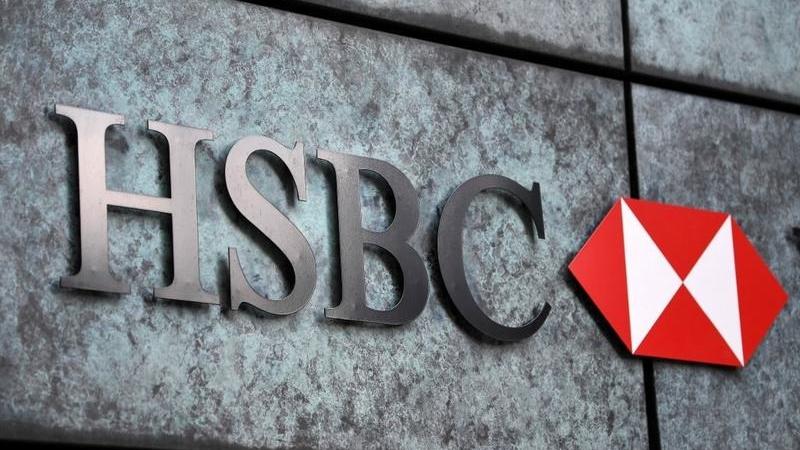 In this photo taken on Aug 3, 2020, a HSBC logo is pictured on a wall outside a branch of the bank in central London. (PHOTO / AFP)
In this photo taken on Aug 3, 2020, a HSBC logo is pictured on a wall outside a branch of the bank in central London. (PHOTO / AFP)
HONG KONG - HSBC tripled its profit in the first quarter as rising interest rates boosted its income, beating analyst forecasts and helping the bank pay its first quarterly dividend since 2019.
The strong results reported by HSBC and Asian rival DBS on Tuesday underscore how aggressive policy tightening has lifted profit margins, even though it has also sparked banking sector turmoil in the US and other markets.
On Monday, regulators seized First Republic Bank and sold its assets to JPMorgan Chase & Co, in a deal to resolve the largest US bank failure since the 2008 financial crisis and draw a line under the bank sector jitters.
HSBC posted a pretax profit of $12.9 billion for the quarter ended March, versus $4.2 billion a year earlier. The average estimate of 17 analysts compiled by the bank was $8.64 billion
With the rate cycle nearing a peak, the challenge for the likes of HSBC, Europe's largest bank, will be to sustain its margins this year and beyond.
CEO Noel Quinn said on a call the results showed HSBC's strengths in a rising rate environment, and played down the risks of further contagion after First Republic's rescue.
"We do not believe there is a global banking crisis on the horizon. We do not see a negative impact on our business".
HSBC posted a pretax profit of $12.9 billion for the quarter ended March, versus $4.2 billion a year earlier. The average estimate of 17 analysts compiled by the bank was $8.64 billion.
ALSO READ: HSBC Q4 profit nearly doubles, interest rates boost revenue
HSBC shares rose as high as 6 percent in London, the second best performer on the benchmark FTSE index.
The bank's revenue "showed strength notably in non-interest income", analysts from Jefferies said, with more than $1 billion from assets held for trading and global banking and HSBC's markets unit, which saw a 20 percent revenue rise from a year ago.
HSBC's headline profit was boosted by a reversal of a $2 billion impairment it took against the planned sale of its French business, reflecting that the deal may not go through.
It warned last month the disposal could be in jeopardy over regulatory capital concerns for the buyer.
London-headquartered HSBC also reported a delay in the sale of its Canada business, a key part of its strategy to shrink in slow-growing Western markets where it lacks scale.
HSBC said the planned $10 billion sale, originally slated to be completed by the end of this year, will now only likely go through in the first quarter of 2024.
Shareholders' meeting
HSBC has tried recently to accelerate its Asian pivot, in part to head off calls from its biggest shareholder, Ping An Insurance Group Co of China, to spin off the Asia unit to boost shareholder returns.
Shareholders will vote at the bank's annual meeting on May 5 on two resolutions filed by a Hong Kong investor and supported by Ping An, calling for higher dividends and a regular update on strategic proposals.
HSBC, which has opposed the resolutions, criticized the spin-off proposal again on Tuesday. Shareholder advisory firms Glass Lewis and Institutional Shareholder Services recommended that investors vote against the proposal, which needs 75 percent approval to pass.
Norway's state investment fund, HSBC's fourth biggest shareholder with a 3 percent stake, has also said it will vote in line with the bank, which announced a $0.10 per share dividend and flagged the first of a new buyback cycle of up to $2 billion.
READ MORE: HSBC pays dividend after quarterly profit beats estimates
HSBC reported deposits fell 0.6 percent to $1.6 trillion, excluding those it acquired by bailing out the UK arm of failed US lender Silicon Valley Bank and the reclassification of French retail deposits. Quinn said the drop was "nothing significant".
Big European banks have reported deposits falling as consumers, faced with a cost of living crisis, eat into savings and shop around for higher-paying products such as fixed-term deposits and investment funds.
Despite the surging profit, HSBC did not raise its key performance target of a return on tangible equity of at least 12 percent from this year onwards, which analysts were anticipating.
HSBC's results showed a strong overall performance but a failure to upgrade its outlook was overly cautious, Citi analysts said.



